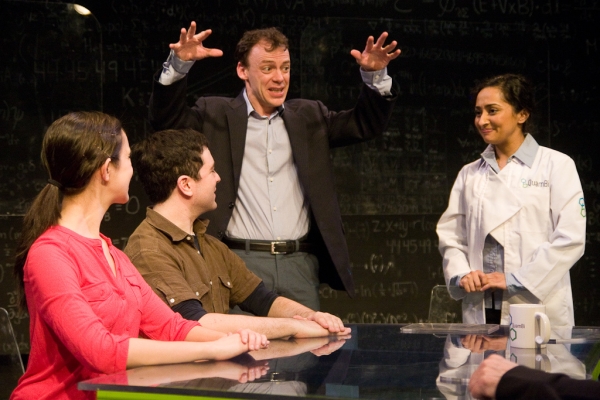DEINDE Review: Leora Rosenberg, Washington Square News

Photo by Justin Hoch at jhoch.com. Pictured: Rachael Hip-Flores, Isaiah Tanenbaum, Matthew Trumbull, Nitya Vidyasagar. Post by August Schulenburg.
OK, so this is interesting: our two most negative reviewers came on the same night, a Wednesday in the second week that was one of our smallest, quietest houses. I would like to believe that my play can succeed without a big house just as I’m sure these reviewers would like to believe their opinions are unswayed by their fellow audience members. But I’ll tell you, I am deeply influenced by those around me. A good audience makes me catch things I might have otherwise missed, and feel things more deeply and in more unexpected ways.
We can’t view either of those reviews through this light, but that Wednesday did feel deadly, in spite of a strong performance from the cast. That awful wall went up between the house and the stage, and the actors carried on without the audience’s support. (For the record, we had a small house that was awesome, and a big house that made me fret, so size doesn’t always matter, but bigger is usually better for many reasons).
All right, let’s get down to it. Critique #1: she claims I don’t trust my audience because in the program I talk about the genesis of the play. Beginning the review this way makes me not want to bother reading the rest of it, because lord knows it takes a lot of faith in an audience two write a play that long with this much science and darkness. At best, this critique is speculative, and at worst, it’s insulting. I’ll choose not to be insulted, because I don’t know if that was her intention (and really, who wants to waste time feeling insulted?), and tone can be tough read, especially by a reviewer in whose work you’re unfamiliar.
This unfortunate dismissive tone weakens the rest of the review. For example, she uses the language “the unspecified (but conveniently frightening) virus.” You really have to not be paying attention to miss that the virus isn’t like any existing today, as the scientists talk at length about what makes it so dangerous. “The plot is by no means groundbreaking” is also weak tea. What other plot is it like, and in what way?
Thankfully, she does offer some specifics later. The criticism that Jenni’s “national security” line deflects us from the show’s emotional core strikes me as an odd comment, but one worth exploring. If Jenni stayed and did talk to Mindy about DEINDE, what would happen? Mindy would certainly take action, and that action would of necessity change the entire plot. To me, their inability to connect is what’s moving about that scene, particularly in how it plays out in the final scene. Still, this criticism interests me, and I’m curious if others felt the same way.
Unfortunately, she lets her review down in the end by taking Nabanita quote out of context. Her full line is: “But maybe, I don’t know, but maybe it’s all right for us to be happy now, right now, I don’t know.” What makes the line beautiful is the fact that Nabanita’s depth of feeling has reduced this hyper-articulate scientist to ask for a dangerous thing in a painfully awkward way.
Ah, well. I wish I could make every theatregoer happy, but if I could, then we wouldn’t need other playwrights, and that would be awful lonely living, right?




Recent Comments